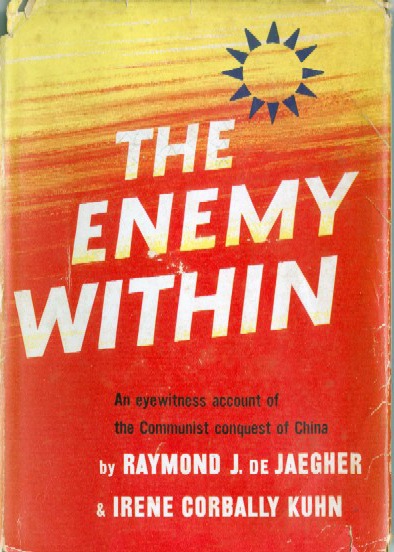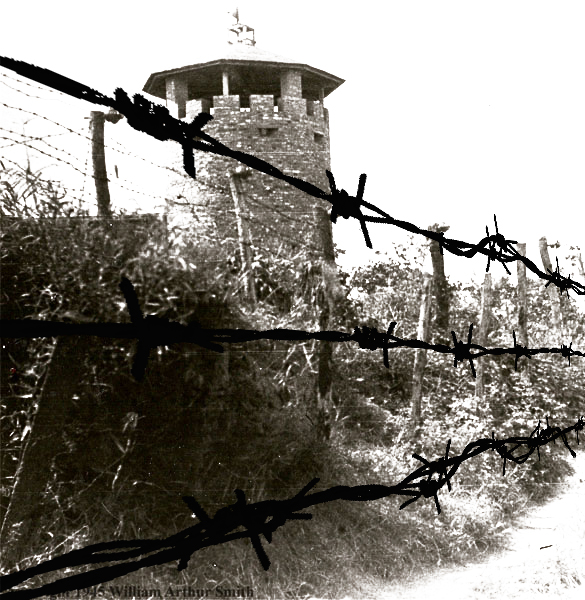
- by Raymond deJaegher
[Excerpts] ...
[...]

It was only natural, since we had had so much success getting our mail out, that we should have thought of getting ourselves, out.
[excerpt]
One of our numbers was a brave and ingenious Englishman named Laurie Tipton, who had been connected with the British American Tobacco Company before the war. Tipton knew agents of the company in the city of Weihsien, but they were afraid of the Japanese and were of no help to us.
Then through one of the American Franciscan brothers in camp I made contact with an Irish priest in Chow T’sun. This village was a hundred miles away from us, but soon we were in frequent touch with him and, through him, with much of what was going on, because he had a radio and collected all the news that came over it, wrote it out, and assembled it in readable form. He gave this to his Chinese servant, who came by railway to Weihsien, walked to the camp, and at an appointed hour, threw the packet over the wall.

We passed the news around, and it was very welcome indeed because up to then the only China news we had was from an occasional issue of the Peiping Chronicle, which of course was all Japanese propaganda.
Tipton and I agreed to work together about this time to establish sources outside and try to arrange for the two of us to get away. Little by little we accumulated maps, information about the country, location of enemy forces, Communist forces, all that. We also learned to our great joy that there were Nationalist guerrillas nearby, and through my faithful lavatory coolies I made contact with them. This took a lot of time because among the coolies, who were changed every month, there were Nationalists and Communists as well as Chinese who were pro-Japanese.
I had always to have one reliable man on the coolie staff. When a change in the shift was coming he would advise me, and then on the first day of the change, while the old crew and the new crew worked together, my reliable man in the outgoing group would evaluate all the new ones for me. Before the day was out he always passed the word along to the right man and to me, and again I had someone I could trust. My “office” was a small lavatory near the kitchen, away from the others, which I could close off for as much as an hour while we talked and made plans and exchanged messages.
Although we had made contact with the Nationalist guerrillas, we still had a long row to hoe before we could join them. We consumed a year in making plans to escape and in infinitely detailed preparations. There was three items of the preparation we had to be sure of. First, the night of escape must be one when the moon would not be at its full until an hour after we had gone over the wall - we had to be sure of an hour of darkness in which to get a real start, and full moonlight to find our way.
The second important particular concerned the guards. The Japanese used three teams of guards. One group came on duty on Monday and had two days off; the second group worked Tuesday and had two days off; the third group took over on Wednesday and had Thursday and Friday off. Then the first team took over again for one day on and two off, and so on. By means of this rotating system the guards were on a continuous twenty-four hour duty, so often times they were not as alert and careful as they were supposed to be.
We had to watch and study the three teams, and after a bit we learned that two teams were faithful and strict, one team was careless. The lazy team would go to the watchtowers and stay on guard for an hour or so and then sneak off for a cup of tea or a smoke. We charted their behaviour, and when we were sure of its regularity we had then to fit this item into the moon-darkness element and make certain that the careless team was on duty on the escape night, with the moon at full at precisely the right hour after we had taken off.
The third point was to be sure the Chinese Nationalist guerrillas could move with safety and be waiting at an agreed-upon point, about two miles from camp, a cemetery plainly identifiable by its fir trees and grave mounds.
As I said, it took a year of careful working out and fitting together of these principal elements in our plan, but finally all was ready. The date was set; we had word from the guerrillas that they would meet us at the cemetery and lead us to their hideout headquarters. We were confident we could reach there by the time the roll call was taken next day in camp. Everything was set; Tipton and I were geared up for our effort.
Three members of the governing committee in camp knew we were going over the wall, and I had confided also in Father Rutherford, one of the American Franciscans. He had been troubled about it for a long time and had talked to me at length about it. But I had been so busy with preparations; my mind had been so intensely preoccupied with arranging all the details of our safe getaway, that he had never carried the discussions to any lengths that might have upset the scheme. However, as the day came Father Rutherford begged me not to go for fear of reprisals against the innocent people in camp. He was so persuasive, so greatly concerned, that I could not with clear conscience disregard his earnestness and flout his wishes. On the other hand “ I did not feel that I had any right to prevent Tipton’s leaving or his taking someone else in my place, and another young man volunteered. He was Arthur W. Hummel, Jr., who had been an instructor in Fu Jen Middle School in Peiping until the outbreak of the war. I gave them my Chinese clothes and helped them over the wall, and then I retired to pray for their safety. They were over the wall, true; but they had to clear the live electric wire before they could make a safe getaway. They were prepared to do this by going through one of the sentry watchtowers. The Japanese had installed these live wires at all the sentry boxes in such a way that the guards could come and go in safety. A safe getaway depended on the sentries’ absence from their post, and this is why we had had to study their habits and time the escape for a night when the careless team of guards had the sentry duty and would be sure to sneak away for a few minutes to have a smoke and a cup of tea.
Tipton and Hummel had promised that if they succeeded in getting to the guerrillas they would work out a code and send it back so we could ‘keep in touch with each other just before I said good-by to them in the darkness we decided on an identifying word I would use to find the coolie who would bring in the code.
Those first moments after Tom Wade and Roy Chu and I boosted Tipton and Hummel over the wall and heard the soft thud of their feet on the other side were anxious ones. Many times before I had done this with the Chinese merchants and agents with whom we did business. Once, with Tipton, I had even rehearsed the dash through the watchtower in broad daylight when the sentry was absent, but this, somehow, was different. I lingered there in the silence and the darkness, but no sound reached my ears after I heard the last stealthy footfalls of the two men. There was no harsh Japanese order to halt; and, thank God, there were no shots to tear the blessed silence.
The hour of darkness passed and the moon’s rise found me breathing easier; by the time the moon was riding the heavens in full glory I was content. I knew that Tipton and Hummel were well on their way to the guerrillas’ hideout.
The Japanese did not notice the men’s absence at roll call, but Mr. Mac Laren reported them as missing. We had agreed on this plan beforehand in order to avoid reprisals and trouble for the other internees. Since only a few of us had known the plans, the amazement of the other internees was genuine and complete, and this fact alone made things easier. The Japanese soon accepted the inevitable. Two men had made their escape. The noise and uproar inside the camp soon died down.
My natural impatience kept me on tenderhooks and I worked every day with the lavatory coolies, but no single hint was forthcoming from any one of them that he had any message for me. Two, three months went by. And then one day, as I was mumbling “fifty-six,” the identifying word, a new coolie sided over to me and whispered that he had something for me. When we could get into my “office,” which I insisted needed this man’s special attention, he brought out a small tightly rolled paper he had secreted inside the padding of his trousers.
My excitement was twofold, for this was the first concrete evidence I had had that the men had managed to get away safely, and now we had a means of communicating with them and, through them, with the National Government. I confided now in two of any close friends, Mr. Mac Laren and Dr. H. W. Hubbard, a Protestant minister I had known in Paoting, and the three of us arranged to send out our first code message. We typed it on a piece of white silk torn from an old handkerchief. The material was so soft the coolie could conceal it easily in his sleeve.
“Send us latest news,” we wrote, restraining ourselves until we could be sure the code would work. Somehow, the fact that two men had got away and were now free and able to get word to us and receive news from us made our incarceration less binding and onerous. Tipton and Hummel were on the Shantung peninsula with the guerrillas, and the underground message system was working so well that very soon we had a reply from our first code message. They had established radio contact with Chungking and were able to tell us the progress of the war. The tide had begun to turn and we grew more hopeful daily.
[further reading] ...http://www.weihsien-paintings.org/rdjaegher/text/R_deJaegher(WEB).pdf
#








